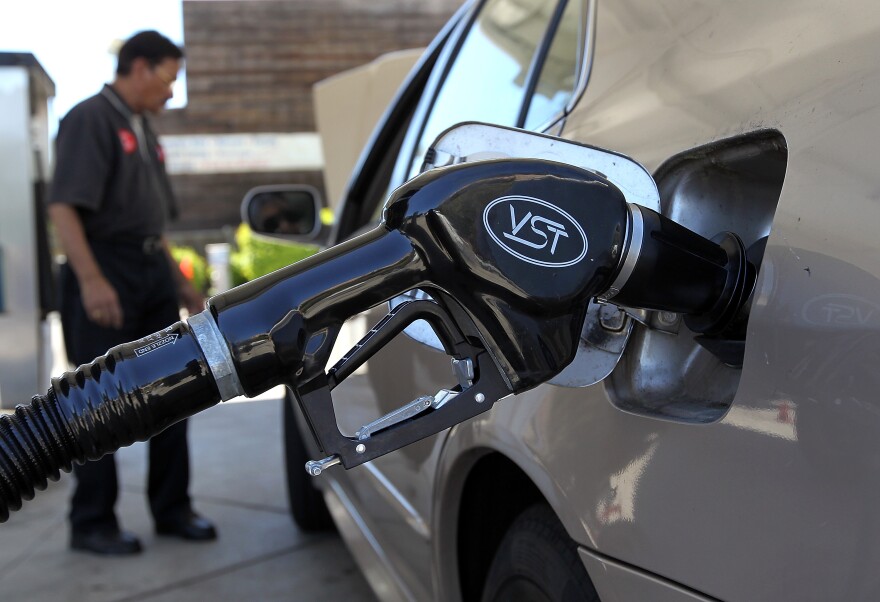This story is free to read because readers choose to support LAist. If you find value in independent local reporting, make a donation to power our newsroom today.
This archival content was originally written for and published on KPCC.org. Keep in mind that links and images may no longer work — and references may be outdated.
California asks: Fix roads by taxing miles instead of gas?

The California legislature is expected to take action this week on a comprehensive plan to fund road repairs through an increase in the gas tax and other steps. But the state is also experimenting with a completely new way of raising money for highway maintenance: taxing consumers on how far they drive, rather than on how much gas they buy.
The state has a $130 billion backlog in needed road repairs. Even if the gas tax is increased and tied to inflation, as proposed, the funding gap could persist if cars continue to become more fuel efficient or go electric, which will mean people driving farther while buying less gas.
So last summer CalTrans rolled out a pilot program to test the different approach. It's tracking the mileage driven by about 5,000 volunteers with a variety of systems, from low-tech manual odometer checks to high-tech devices that plug into a car's on-board diagnostic port and pair with a smartphone app.
I am participating in the pilot and using such a device, which also helps improve driving performance and car maintenance by monitoring the engine and battery, how fast I'm driving and how I apply the brakes.
Participants in the pilot aren't actually charged for the miles they accrue; they're sent mock bills that estimate what they would owe compared with their estimated gas tax charges during the same period.
Oregon is the first state in the country to officially launch a mileage-based road charge program. Since July 2015, about 1,300 drivers have volunteered to track their mileage. They are charged or credited the difference between the mileage they accrue and what they pay in gas tax.
"Things have been going great," said Michelle Godfrey, spokeswoman for the Oregon Department of Transportation's OreGo program. "The best lesson that we’ve learned is that it works."
A survey of participants showed more than 90 percent were satisfied with their experience, she said.
But there are worries about privacy.
"Some people have expressed concern that they don’t want the government to have information about where they’re driving," said Liisa Ecola, a senior policy analyst with the RAND Corporation who has studied the idea.
In Oregon, the law prohibits the government from collecting any data beyond mileage, and Godfrey said more than 70 percent of participants had chosen to track their mileage with a GPS device because of the additional services it offers.
In California, Caltrans will present a report to the legislature after the one-year pilot ends this summer.
Ecola said mileage-based charges can be tough to roll out on a more widespread basis because the payment systems are more costly and complex than simply collecting sales tax at the pump.
For one thing, most pilot systems have used automatic charges from web-based accounts, which would exclude people without credit cards.
Having a checkerboard system of gas taxes and mileage fees between different states would also make it more complicated to charge for interstate travel, especially for high-volume road users like trucking companies.
But ultimately, Ecola believes there is great promise in switching to a mileage-based fee system.
"If you implement a very sophisticated mileage fee you can accomplish multiple objectives with it," she said.
For instance, the tracking devices could also charge market-based prices per mile, said Ecola. That would help manage congestion, similar to how some toll lanes charge higher prices during peak hours to encourage travel when the roads are less congested.







